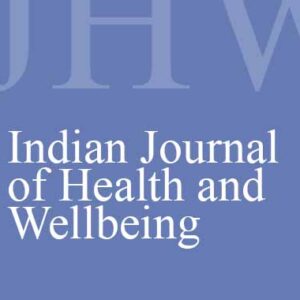
Effect of ’12 day induction training for ART/CCC counsellors’ under GFATM project in India: An in-depth study
Original price was: ₹ 202.00.₹ 200.00Current price is: ₹ 200.00.
Pages: 277-283
Sibnath Deb (Department of Applied Psychology Pondicherry University, Pondicherry)
Chirasree Mitra and Bishakha Majumdar (Department of Applied Psychology University of Calcutta, Kolkata)
Jiandong Sun (School of Public Health University of Technology, Brisbane, Australia)
The broad objective of the ’12 Day Induction Training for antiretroviral therapy and community care centre (ART/CCC) Counsellors’ was to impart knowledge and skills among ART/CCC counsellors with special reference to adherence, the medical aspects of intervention and the role of CCC and to study the impact of the training. The training programme was designed following the training schedule suggested by National AIDS Control Organisation (NACO). A group of 15 ART/CCC Counsellors from the North East States of India participated in the training. Out of the 15 participant counsellors, 10 were females while 5 were males. The training methods included interactive classroom lectures, group activities, role play and field visit. The resource persons for the training programme were the Master Trainers as well as qualified and experienced professionals. For evaluation of the training programme, pre-test and post-test design was followed and data were collected before and after the training using a Pre and Post Training Knowledge Questionnaire. A comparative analysis of pre and post training data demonstrates a clear trend of overall significant knowledge increase and skill development in all the 30 parameters, with small variations (p<0.01). Average score of the participant counsellors in the pre-training assessment was 19.0 while in the post-training assessment it was 38.5. The difference was found to be statistically significant at the 0.05 level. However, out of 21 knowledge areas there was no significant knowledge gain in about half of the areas while there was significant skill development in seven areas out of nine. Scores of pre and post training knowledge questionnaire were categorized into three grades i.e., 'Grade A' (score range: 41 60); 'Grade B' (score range: 21 40) and 'Grade C' (score range: '0 20'. Analysis of the pre training data demonstrates that out of the 15 counsellors, 9 and 6 were in 'Grade-C' and 'Grade-B' respectively. After attending the 12 day training, 7 counsellors had been promoted to 'Grade A' while 8 were found to be in 'Grade-B'. The feedback about the various aspects of the training clearly indicates that the training was highly beneficial and useful. In fine, it might be stated that the 12 day induction training for ART/CCC counsellors using the NACO modules benefitted the target audience to gain more knowledge, skill and confidence in delivering professional services to the beneficiary.
Description
Pages: 277-283
Sibnath Deb (Department of Applied Psychology Pondicherry University, Pondicherry)
Chirasree Mitra and Bishakha Majumdar (Department of Applied Psychology University of Calcutta, Kolkata)
Jiandong Sun (School of Public Health University of Technology, Brisbane, Australia)
